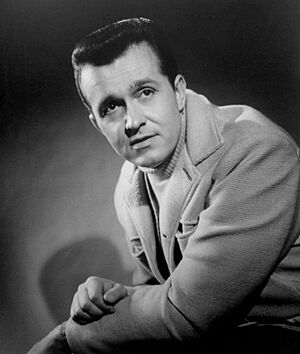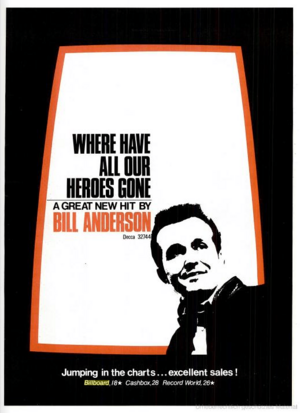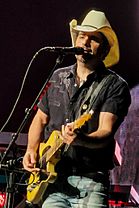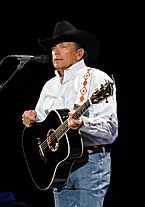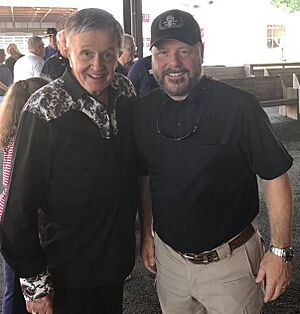Bill Anderson facts for kids
Quick facts for kids
Bill Anderson
|
|
|---|---|
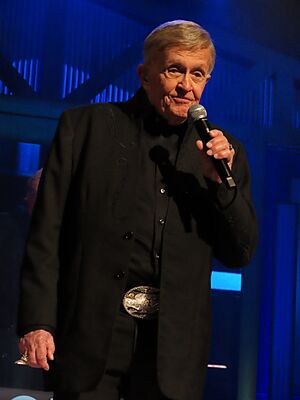
Anderson in 2022
|
|
| Born |
James William Anderson III
November 1, 1937 Columbia, South Carolina, U.S.
|
| Alma mater | University of Georgia |
| Occupation |
|
| Years active | 1957–present |
| Spouse(s) |
|
| Partner(s) | Vickie Salas (2008–died 2019) |
| Children | 3 |
| Musical career | |
| Also known as | Whispering Bill |
| Genres | |
| Labels |
|
James William Anderson III (born November 1, 1937) is an American country music singer, songwriter, and television host. People often call him "Whispering Bill" because of his soft singing voice. He has written many songs that other famous artists have recorded since the late 1950s.
Bill Anderson grew up in Decatur, Georgia. He started writing songs when he was in high school. While in college, he wrote "City Lights". This song became a huge hit for Ray Price in 1958. Because of his songwriting, Anderson signed his first record deal with Decca Records that same year. Soon after, he started having his own big hits.
In 1963, he released "Still", which became his most successful song. It was a hit in both country and pop music. After that, he had many more top-10 songs. These included "I Love You Drops", "I Get the Fever", and "Wild Week-End". Other artists also recorded his songs. In 1964, Connie Smith had her first big hit with his song "Once a Day". In 1971, Cal Smith had a number-one song with Anderson's "The Lord Knows I'm...".
During the 1970s, Anderson continued to have major hits as a singer. Songs like "Love Is a Sometimes Thing" and "All the Lonely Women in the World" became very popular. His music style changed to a smoother country sound, known as countrypolitan. An example is his song "I Can't Wait Any Longer". In the early 1980s, he left his record label. He then had a short career in television, hosting game shows like The Better... and Fandango.
Anderson started writing songs again in the early 1990s. He wrote for new country stars. Working with other writers, he created hits for Vince Gill, George Strait, Kenny Chesney, and Steve Wariner. He also kept releasing his own music in the 1990s. In 1998, he released Fine Wine, his first major album in over ten years. He continued to release music on his own record label, TWI. This included gospel and bluegrass albums. His most recent studio album came out in 2020. Throughout his career, he has won many awards. These include honors from the Academy of Country Music and the Country Music Association. He is also in the Songwriters Hall of Fame and the Nashville Songwriters Hall of Fame.
Contents
Early Life and Music Beginnings
James William Anderson III was born in Columbia, South Carolina. His parents were Elizabeth and James William Anderson Jr. His sister Elizabeth was born two years later. His mother stayed home, and his father was an insurance agent. The family moved to Decatur, Georgia, when Bill was in third grade. He attended Avondale High School there.
Anderson described his childhood as "average." He said his family always had enough food, but not many fancy things. In school, he played baseball and football. But he was most interested in music. His grandparents played instruments, which inspired him. He also watched country musicians on a radio station above his father's office. Soon, he saved enough money to buy his own guitar. At age 10, he wrote his first song, "Carry Me Home Texas."
High School and College Years
In high school, Anderson and his friends started a band. They won a school talent show. Their band, the Avondale Playboys, performed locally and on the radio. Anderson was also a good baseball pitcher. The Chicago Cubs even invited him to their training camp. However, he chose to go to college instead. He enrolled at the University of Georgia and studied journalism.
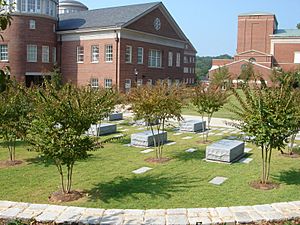
Anderson had already tried journalism in high school. He wrote for his school newspaper. He also covered sports for The Atlanta Journal-Constitution. In college, he joined the Kappa Sigma fraternity. He formed another country band called the "Classic City Playboys." They played at local events. He also became interested in working at a radio station. A DJ friend showed him how the controls worked. "I knew that night I had to get a job as a disc jockey," he remembered.
Anderson graduated from college in 1959. He worked as a rock and roll DJ at WGAU in Athens, Georgia. He was fired for playing country music. Then, he got a job at WJJC in Commerce, Georgia. There, he started writing songs again. In Commerce, he wrote "City Lights." This song eventually led him to Nashville. That's where his songwriting and singing careers truly began.
Bill Anderson's Singing Career
Early Hits (1958–1962)
Anderson's own singing career started in 1957. He released two songs on a small record label called TNT. These songs, including his own version of "City Lights," didn't get much attention. But when Ray Price's version of "City Lights" became a hit, Anderson visited Nashville, Tennessee often. He brought his songs for other artists and producers to record.
Owen Bradley from Decca Records was impressed by Anderson's writing. He decided to sign Anderson as a singer. Anderson officially joined Decca in the summer of 1958. His first songs for Decca were all written by him. His first Decca song, "That's What It's Like to Be Lonesome," came out in December 1958. It became a hit the next year, reaching number 12 on the Billboard country chart. In 1959, he had more top-20 hits like "Ninety-Nine" and "Dead or Alive".
In 1960, "The Tip of My Fingers" became his first top-10 country hit. It reached number seven. Later, other artists like Eddy Arnold and Steve Wariner also had hits with this song. In 1961, "Po' Folks" reached number nine on the country chart. Because of this success, Anderson was invited to join the Grand Ole Opry. He accepted and became a member that same year. This was followed by his first number-one hit, "Mama Sang a Song". This song also appeared on the Billboard Hot 100 pop chart.
"Still" and Continued Success (1963–1976)
By 1963, Anderson's singing career was growing. He traveled a lot and made public appearances. He wrote his 1963 song, "Still," after meeting an old girlfriend. He wrote the lyrics on a typewriter at three in the morning. "Still" became the biggest song of his career. In April 1963, it reached number one on the country chart. It also became a big hit on the Billboard Hot 100 pop chart, reaching number eight. The song was also a hit on the easy listening chart. The success of "Still" led to his first album, also called Still. This album reached the top 10 on the country albums chart.
The success of "Still" made Anderson even more famous. He appeared on national TV shows like American Bandstand. He performed his next hit, "8×10", there. He won awards from music magazines like Billboard and Cashbox. He booked more concerts and earned more money. His record label, Decca, started releasing his albums more often. These albums were also successful. His second album, Bill Anderson Sings (1964), reached the top 10. His 1966 album, I Love You Drops, reached number one. More hit songs like "Bright Lights and Country Music" and "Five Little Fingers" helped sell these albums.
His hits continued through the 1960s. Many of these songs he wrote himself. His 1966 song, "I Love You Drops," was inspired by a Chuck Berry song. His next self-written song, "I Get the Fever," also became a number-one hit. He had more top-10 hits with "Get While the Gettin's Good" and "No One's Gonna Hurt You Anymore". During this time, Anderson formed his touring band, "The Po' Boys." He also started his own TV show, The Bill Anderson Show.
In the mid-1960s, he began singing duets with country artist Jan Howard. They were both on Decca Records. They thought they could be a good singing team. Their producer agreed, and they released their first song in 1965. In 1968, they had their first big hit with "For Loving You". This song became a number-one hit and led to more successful songs together.
Anderson reached number one for the fifth time in May 1969 with "My Life (Throw It Away If I Want To)". He also released different kinds of albums. He made a gospel album, I Can Do Nothing Alone, in 1967. He also released a Christmas album, Christmas, in 1969. A collection of his greatest hits also came out and was very popular. He continued to release regular country albums, sometimes three a year. His country albums often had a mix of his own songs and cover songs. In the early 1970s, he had many more top-ten hits. These included "Love Is a Sometimes Thing" and "Where Have All Our Heroes Gone". In February 1974, he had his first number-one hit in five years with "World of Make Believe".
Changes in the Late 1970s and 1980s
By 1977, Anderson's career saw some changes. His duet partner, Jan Howard, left his record label. She said touring was too hard. Mary Lou Turner replaced her. In 1976, Turner and Anderson had a number-one hit with "Sometimes". Anderson's record label also changed its name to MCA Records. His longtime producer was replaced by Buddy Killen. With Killen, Anderson's music style changed. It moved from soft country songs to more upbeat countrypolitan tunes.
His new sound was heard in his albums and songs. In 1977, he had two big hits: "Head to Toe" and "Still the One". The next year, he had a major hit with the dance-flavored "I Can't Wait Any Longer". This song reached number four on the country chart. It also reached number 80 on the pop chart. His album, Love...& Other Sad Stories, also did well.
Even though his music was successful at first, some writers didn't like Anderson's new style. They said his music "flirted dangerously with disco beats." His sales started to drop after "I Can't Wait Any Longer." His next album, Ladies Choice (1979), didn't sell as well. After his last MCA album in 1980, he left the label.
In the mid-1980s, Anderson focused on other things. He had a short TV career in California. He also continued to record music sometimes. On an independent label, he released Southern Fried in 1983. This album had four songs that became minor hits. In 1986, Anderson released A Place in the Country. Four songs from this album also became minor country hits.
New Directions (1990s–Present)
In the early 1990s, Anderson focused more on writing songs. But he still recorded his own music. His first album of the decade was 1992's Country Music Heaven. It was a collection of gospel songs. This album was inspired by his grandfather, who was a preacher. The main song from the album was released, but it didn't appear on any Billboard charts.
In 1998, Anderson signed with Warner Bros. Records. This was part of a project for older artists. That year, he released his 36th album, Fine Wine. It was produced by Steve Wariner. Critics had mixed feelings about it. He tried new artistic styles with his next album, A Lot of Things Different (2001). This album had a traditional country sound. Anderson said it was his most traditional effort yet.
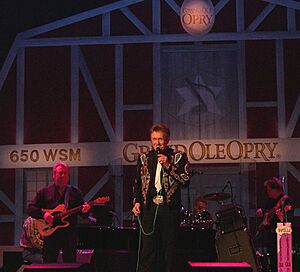
Anderson's artistic styles continued to grow in the 2000s. After a Christmas album, he released a third gospel album in 2004. A year later, he released a modern country album called The Way I Feel. It included his own version of Brad Paisley's "... Lullaby" and his own songs. In 2007, Anderson released his first bluegrass music album, Whisperin' Bluegrass. It featured collaborations with Vince Gill and Dolly Parton.
In 2010 and 2014, Anderson released two albums he produced himself: Songwriter and Life!. In 2018, his 44th album, Anderson, came out. It included a song with Jamey Johnson. He followed this with his 45th album in 2020, The Hits Re-Imagined. This album had new versions of his old hits and songs he had written. Billboard magazine gave it a good review. In June 2022, a collection of his best songs was released. It included a new song with Dolly Parton.
On July 22, 2023, Anderson was honored. He became the longest-serving member of the Grand Ole Opry. He has been a member for 62 years since 1961.
Bill Anderson's Songwriting Career
Breakthrough in Nashville (1958–1979)
Anderson's writing career started at the same time as his singing career. His 1958 song, "City Lights," led to his success as a songwriter. Anderson remembered writing the song on a hotel roof. "I was up there one night in 1957 – I was 19 years old – and I managed to write the 'bright array of city lights as far as I can see'," he said. After Anderson's own version was released, Ray Price heard it. Price's record label picked it up, and it became a number-one hit in 1958.
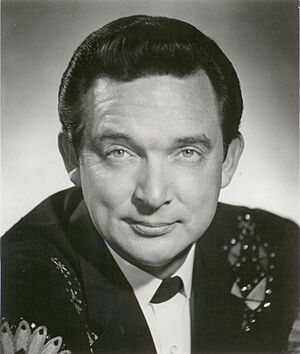
The success of "City Lights" led Anderson to get a contract with a music publishing company in Nashville. This contract allowed him to write songs for himself and for others. One of his next hits as a writer was "I Missed Me," recorded by Jim Reeves. This song became a major country hit, reaching number three in 1960. Another hit was "I Don't Love You Anymore," recorded by Charlie Louvin in 1964. It became Louvin's biggest solo hit. That same year, Lefty Frizzell recorded Anderson's "Saginaw, Michigan." This song became Frizzell's first number-one hit since 1952.
During this time, he wrote two hits for Porter Wagoner. These included "I'll Go Down Swinging" in 1964. Anderson also wrote songs for his duet partner, Jan Howard. She had major hits with his songs like "Count Your Blessings, Woman" and "Bad Seed". "Bad Seed" was a top-ten hit for Howard in 1966.
Anderson also wrote several hits for Connie Smith. He even helped her get her first record deal. Anderson found Smith after hearing her sing in a talent contest. He helped her come to Nashville. There, she recorded some demo tapes that producers at RCA Victor Records heard. In 1964, Smith signed with the label. Anderson's song "Once a Day" was recorded by Smith in 1964. It was her first song and stayed at number one on the country chart for eight weeks. This made it his most successful song as a writer at that time. Anderson continued to help Smith's career. He wrote many of her next hits, like "Then and Only Then" and "Cincinnati, Ohio". He also helped her become a member of the Grand Ole Opry.
Anderson also wrote songs for pop artists. In the 1960s, Brenda Lee recorded his song "My Whole World Is Falling Down". This song reached number 24 on the pop chart in 1963. Other pop artists like James Brown and Aretha Franklin also recorded his songs. However, his most successful songs were recorded by country artists. In 1972, Cal Smith recorded Anderson's "The Lord Knows I'm...", which became a number-one country hit. The next year, Jean Shepard recorded Anderson's "Slippin Away". This song became Shepard's first top-10 hit in four years. Conway Twitty also had a number-one hit with "I May Never Get to Heaven" in the same decade.
Writing Changes (1980–1991)
Anderson's writing and singing careers slowed down at the same time. In the early 1980s, he wrote music less often. He focused on TV projects instead. "I just knew that this is what I wanted to do for my life's work," he said. In a 2020 interview, Anderson explained that country music was changing. It was moving towards pop music. Because of this, he found it hard to write for other artists. "Country music was changing and I was wondering if I could still fit in," he recalled.
Anderson didn't stop writing completely for his own albums. On his 1983 album, Southern Fried, he wrote three songs. His 1986 album, A Place in the Country, had two songs he wrote or co-wrote. However, only one song on the album was entirely his. Anderson also focused on other writing projects. In 1989, he released his first autobiography, Whisperin' Bill.
Return to Songwriting and Collaborations (1992–Present)
In 1992, country artist Steve Wariner recorded Anderson's 1960 hit "The Tip of My Fingers." This song became a top-five hit on the country chart that year. It inspired Anderson to start writing again. "Steve's version of 'Tips' showed that words, melodies, and feelings can last for decades," he said. One of his next songs was "Which Bridge to Cross (Which Bridge to Burn)". He wrote it with Vince Gill. This song was written during a "writing appointment." This is when songwriters meet to create music together. "Which Bridge to Cross" was released by Gill in 1994. It became a major hit, reaching number four on the country chart. Anderson said this song's success helped him connect with younger songwriters in Nashville. He started getting calls from other writers and singers. Anderson wasn't used to writing with others, but he changed his style to work with them. "I let a lot of young kids tell me a lot of things, and I benefited from that, greatly," he said.
Anderson started co-writing more often in the 1990s. Wariner had another hit in 1999 with Anderson's song "Two Teardrops". This song reached number two on the country chart. It was also nominated for a Grammy award. Around the same time, he worked with Skip Ewing and Debbie Moore on "Wish You Were Here". Mark Wills released this song, and it became a number-one hit in 1999. Anderson later said this song's success helped him with money problems he had during that time. He followed "Wish You Were Here" with "A Lot of Things Different". He wrote this song with Dean Dillon during breakfast. Kenny Chesney later recorded the song. His version reached number six on the country chart in 2003.
Chesney's song was followed by "... Lullaby", recorded by Brad Paisley and Alison Krauss. Anderson wrote this song with Jon Randall. Randall didn't want to record a demo of the song at first. But Anderson believed it could be a hit. The demo was recorded late one night. Paisley's version was released in 2004. It reached number three on the country chart. In 2005, "... Lullaby" won Song of the Year at the Country Music Association Awards. Anderson remembered the excitement of winning: "I jumped up and hugged Brad and knocked his white Western hat from his head."
In 2006, Anderson co-wrote "Give It Away" with Jamey Johnson and Buddy Cannon. George Strait later recorded it. The song was inspired by Johnson's divorce. It included a spoken part, which was not common in country music then. Strait's version was released in 2006 and reached number one on the country chart. The song later won Song of the Year from the CMA Awards. This was Anderson's third award from the CMA in three years. Later that decade, Anderson worked with other writers to create "Joey" for the duo Sugarland. This song reached the top 20 in 2009. In 2014, Anderson co-wrote Mo Pitney's hit "Country".
Other Contributions
Film and Television Work
From 1965 to 1974, Anderson hosted his own national TV show, The Bill Anderson Show. His duet partner, Jan Howard, and his band, The Po' Boys, were also on the show. The show was filmed in Canada and North Carolina at first. Later, filming moved to Nashville, where Anderson lived. He would tape two thirty-minute shows in front of a live audience. Around this time, he also appeared in country music movies. These included The Las Vegas Hillbillys. He also appeared on national TV shows like The Today Show.
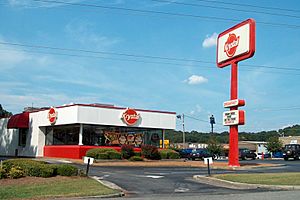
Anderson did more TV work in the late 1970s. From 1977 to 1978, he co-hosted the ABC game show The Better... with Sarah Purcell. In 1980, he appeared on two episodes of the ABC soap opera One Life to Live. He played a fictional version of himself. In the 1980s, Anderson also hosted Backstage at the Grand Ole Opry and the game show Fandango. Both aired on the former Nashville Network (TNN). Fandango was a country music trivia show. "I've gotten into a lot of different things," he said in 1988. He stayed with Fandango until 1989. Anderson was then invited to join the TNN competition show You Can Be a Star. He helped create the scoring system for the show. His touring band was also hired as the show's band.
Anderson appeared as himself on the TV show To Tell the Truth in 1965.
Business Ventures
Anderson also tried business opportunities. Many of them were not successful. In his autobiography, he said, "I've tried to become a businessman a couple of times when I should have kept right on pickin' and grinnin'." In 1975, he bought a radio station in Provo, Utah. He couldn't get enough advertisers to support it, so it failed. Six years later, he sold the station. "I was totally disappointed by something I love," he wrote in 2016.
In the 1980s, Anderson was a spokesperson for the Po' Folks restaurant chain. Its name came from his 1961 hit song. Anderson signed a three-year contract to appear in their radio and TV commercials. He also allowed the company to use his photos and signature. He partnered with the company's vice president to help open more restaurants. Country artist Conway Twitty also joined as a partner. However, some restaurants had money problems. This led to legal fees that Anderson had to pay. The company was also being bought by the larger Krystal fast-food chain. He had to pay back money he owed, which almost made him go bankrupt. With Twitty's help, Anderson paid off the company's debts. "Even as it stood, my little try at the restaurant business wiped out a large chunk of my life's savings," he later said.
Personal Life
Anderson has been married twice and had two other long-term relationships. He met his first wife, Bette (Rhodes), in the late 1950s. They married in December 1959. They had two daughters during their 10-year marriage. Bette also helped with his writing. She co-wrote the 1965 song, "I Can't Remember". Connie Smith recorded this song. The couple separated in 1968 and divorced in 1969. Anderson believed they grew apart because Bette found it hard to understand the music business. Bette Anderson passed away in 2010.
In 1970, he married his second wife, Becky. They had one child together. In 1984, Becky was in a car accident. Her recovery took several years. The couple separated in the 1990s and divorced in 1997.
Anderson dated Vickie Salas around 2008. They had met years before. "We never married, we never lived together, but she became my everything," Anderson remembered. In 2016, Salas was diagnosed with cancer. She passed away in January 2019.
Musical Style
As a songwriter, Anderson has written many different kinds of songs. Some writers called his early songs "cute and sentimental." Examples include "Po' Folks" and "I Love You Drops." Other songs showed "anti-establishment attitudes." Some focused on "desperately bleak" themes. Riane Konc of The Boot noticed a similar pattern in his songwriting. She pointed to 2004's "... Lullaby" as an example. She said it was "packed full of unforgettable images" about "heartbreak, addiction and loss." Konc also praised 2006's "Give It Away," calling it an "instant classic." In a 2018 interview, Anderson described his songwriting style. "The lyric is what attracted me to country music as a young boy," he said. "The story songs that I could listen to and feel some emotion."
Anderson also created a unique musical style as a singer. After signing with Decca Records, he was called "Whisperin' Bill Anderson." This was because of his soft singing voice. Writers and critics have commented on his "whispering" style. Many of his recordings included both singing and speaking parts. Steve Huey of Allmusic called his voice "airy" and "gentle." Stephen L. Betts of Rolling Stone noted that Anderson still has a whispering quality in his recent work. In 2020, Betts said Anderson's vocal style "remains subdued in the present."
Legacy and Honors
Writers and music critics see Anderson as one of country music's most important songwriters. Steve Huey of AllMusic called him "one of the most successful songwriters in country music history." Ken Burns of PBS called him an "acclaimed singer-songwriter." In 2019, The Boot praised Anderson's versatility. "He's the soft voice behind many classic country songs," they said. "But he's also the writer or co-writer of plenty of your current favorites." Kevin John Coyne of Country Universe said Anderson's songwriting is key to his lasting career.
In 1975, Anderson was inducted into the Nashville Songwriters Hall of Fame. In 2001, he joined the Country Music Hall of Fame. In November 2002, BMI named him its first country songwriting icon. In 2018, he was inducted into the Songwriters Hall of Fame. Anderson has also been on lists of top country writers and performers. In 2008, he was ranked 27th on Country Universe's list of the "100 Greatest Men of Country Music." He was also among the "100 Greatest Country Artists of All Time" in a 2017 list by Rolling Stone.
Discography
- Studio albums
- 1963: Still
- 1964: Bill Anderson Sings
- 1964: Showcase
- 1966: Bright Lights and Country Music (with The Po' Boys)
- 1966: I Love You Drops
- 1967: Get While the Gettin's Good
- 1967: I Can Do Nothing Alone
- 1968: For Loving You (with Jan Howard)
- 1968: Wild Weekend
- 1968: Happy State of Mind
- 1969: My Life/But You Know I Love You
- 1969: Christmas
- 1970: If It's All the Same to You (with Jan Howard)
- 1970: Love Is a Sometimes Thing
- 1970: Where Have All Our Heroes Gone
- 1971: Always Remember
- 1972: Bill and Jan (Or Jan and Bill) (with Jan Howard)
- 1972: Singing His Praise (with Jan Howard)
- 1972: Bill Anderson Sings for "All the Lonely Women in the World"
- 1972: Don't She Look Good
- 1973: Bill
- 1974: "Whispering" Bill Anderson
- 1975: Every Time I Turn the Radio On/Talk to Me Ohio
- 1976: Sometimes (with Mary Lou Turner)
- 1976: Peanuts and Diamonds and Other Jewels
- 1977: Scorpio
- 1977: Billy Boy & Mary Lou (with Mary Lou Turner)
- 1978: Love...& Other Sad Stories
- 1979: Ladies Choice
- 1980: Nashville Mirrors
- 1983: Southern Fried (with The Po' Folks)
- 1984: Yesterday, Today, and Tomorrow
- 1986: A Place in the Country
- 1993: Country Music Heaven
- 1996: Greatest Songs
- 1998: Fine Wine
- 2001: A Lot of Things Different
- 2002: No Place Like Home on Christmas
- 2004: Softly & Tenderly
- 2005: The Way I Feel
- 2007: Whisperin' Bluegrass
- 2010: Songwriter
- 2014: Life
- 2018: Anderson
- 2020: The Hits Re-Imagined
Filmography
| Title | Year | Role | Notes | Ref. |
|---|---|---|---|---|
| The Bill Anderson Show | 1965–1974 | Host | ||
| The Las Vegas Hillbillys | 1966 | Himself | ||
| The Road to Nashville | 1967 | Himself | ||
| Alias Smith and Jones | 1972 | Cobb | Episode: "The Men That Corrupted Hadleyburg" | |
| Match Game | 1976–1978 | Himself | 31 episodes | |
| Match Game PM | 1976–1981 | Himself | Seven episodes | |
| The Better... | 1977–1978 | Host | ||
| Password Plus | 1979–1982 | Himself | 17 episodes | |
| One Life to Live | 1980 | Himself | Two episodes: "Grand Ole Opry Part One" and "Grand Ole Opry Part Two" | |
| Match Game-Hollywood Squares Hour | 1984 | Himself | Five episodes | |
| Fandango | 1983–1989 | Host |
Awards and Nominations
| Year | Nominee / work | Award | Result | Ref. |
|---|---|---|---|---|
| 1965 | Grammy Awards | Best Country Song for "Once a Day" | Nominated | |
| 1967 | Best Country Song for "Cold Hard Facts of Life" | Nominated | ||
| Country Music Association Awards | Entertainer of the Year | Nominated | ||
| 1968 | Vocal Duo of the Year (with Jan Howard) | Nominated | ||
| 1970 | Nominated | |||
| 1975 | Academy of Country Music Awards | Top Vocal Group (with Mary Lou Turner) | Nominated | |
| Nashville Songwriters Hall of Fame | Inducted as a Member | Won | ||
| 1976 | Country Music Association Awards | Vocal Duo of the Year (with Mary Lou Turner) | Nominated | |
| 1977 | Nominated | |||
| 2000 | Grammy Awards | Best Country Song for "Two Teardrops" (with Steve Wariner) | Nominated | |
| 2001 | Academy of Country Music Awards | Vocal Event of the Year for "Too Country" (with George Jones, Brad Paisley and Buck Owens) | Nominated | |
| Country Music Association Awards | Won | |||
| Country Music Hall of Fame | Inducted as a Member | Won | ||
| 2002 | BMI Awards | Songwriting Icon Award | Won | |
| Academy of Country Music Awards | Song of the Year for "A Lot of Things Different" (with Dean Dillon) | Nominated | ||
| 2004 | Song of the Year for "... Lullaby" (with Jon Randall) | Nominated | ||
| Country Music Association Awards | Nominated | |||
| 2005 | Won | |||
| 2006 | Academy of Country Music Awards | Song of the Year for "Give It Away" (with Buddy Cannon and Jamey Johnson) | Won | |
| 2007 | Grammy Awards | Best Country Song for "Give It Away" (with Buddy Cannon and Jamey Johnson) | Nominated | |
| Country Music Association Awards | Song of the Year for "Give It Away" (with Buddy Cannon and Jamey Johnson) | Won | ||
| 2018 | Songwriters Hall of Fame | Inducted as a Member | Won | |
| 2023 | Grammy Awards | Best American Roots Performance for "Someday It'll All Make Sense" (with Dolly Parton) | Nominated |
 | Dorothy Vaughan |
 | Charles Henry Turner |
 | Hildrus Poindexter |
 | Henry Cecil McBay |


